Gradle实现自动化加固与多渠道打包

研究这个Gradle自动化脚本初衷是为了实现自动化打包、加固和增加多渠道,从而一键完成应用发布上架应用市场前的所有操作,以达到解放双手和节约时间成本的效果。后期有考虑配合curl指令将打包好的apk自动上传到服务器或者托管平台,亦或可结合Jenkins自动化构建、打包、上传等,从而实现整个流程的自动化目的。
App打包发布前准备
通常我们App上架到应用市场基本上都经历过以下流程,先本地打一个release包,然后通过在线加固或者下载加固工具进行加固,由于加固会先剔除签名信息,所以加固后要进行再次签名,然后生成多渠道包,这样基本上整个流程就结束了,画了个思维导图如下:
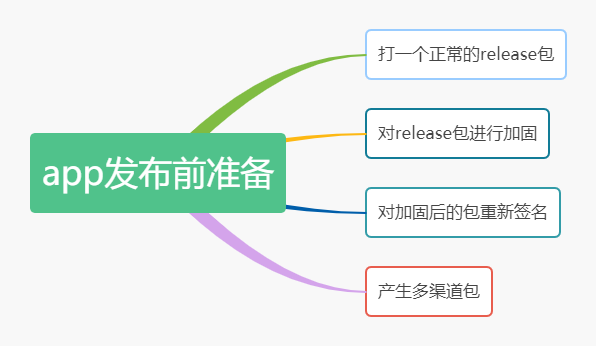
加固介绍
我的简单理解就是给原有的apk进行加密和套壳,产生一个新的apk,然后运行的时候会进行解密相关的动作,所以加固后的app一般会影响启动时间,网上也有很多加固平台的对比,主要涉及启动时间、包体积大小、兼容性、安全性等等。本次研究只是讨论如何实现自动化加固与多渠道打包思想,360加固并非最好选择,加固主要是为了防止应用在上线后被反编译、调试、破解、二次打包和内存截取等多种威胁。
下载360加固保
本次Gradle自动化实践的步骤主要是基于360加固+腾讯的VasDolly多渠道打包。
- 手动下载
官方主要提供Windows、Mac、Linux三种版本, 下载地址 - 自动下载
如果是Mac系统的话,在Gradle中直接使用curl命令即可,如果是Windwos需要下载安装 curl ,curl主要是文件传输工具,可以通过命令行可支持文件下载及传输。
/**
* 自动下载360加固保,也可以自己下载然后放到根目录
*/
def download360jiagu() {
// 下载360压缩包
File zipFile = file(packers["zipPath"])
if (!zipFile.exists()) {
if (!zipFile.parentFile.exists()) {
zipFile.parentFile.mkdirs()
println("packers===create parentFile jiagu ${zipFile.parentFile.absolutePath}")
}
// 加固保的下载地址
def downloadUrl = isWindows() ? packers["jiagubao_windows"] : packers["jiagubao_mac"]
// mac自带curl命令 windows需要下载curl安装
def cmd = "curl -o ${packers["zipPath"]} ${downloadUrl}"
println cmd
cmd.execute().waitForProcessOutput(System.out, System.err)
}
File unzipFile = file(packers["unzipPath"])
if (!unzipFile.exists()) {
//解压 Zip 文件
ant.unzip(src: packers["zipPath"], dest: packers["unzipPath"], encoding: "GBK")
println 'packers===unzip 360jiagu'
//将解压后的文件开启读写权限,防止执行 Jar 文件没有权限执行,windows若没有权限需要自己手动改
if (!isWindows()) {
def cmd = "chmod -R 777 ${packers["unzipPath"]}"
println cmd
cmd.execute().waitForProcessOutput(System.out, System.err)
}
}
}
复制代码
打一个release包
gradle其实为我们提供了一系列相关的任务,如下图
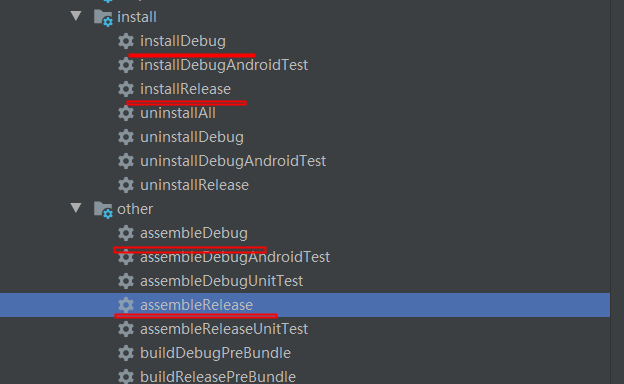
assembleRelease 在加固前先执行
assembleRelease
这个Task。
task packersNewRelease {
group 'packers'
//可以利用task的依赖关系先执行打包
dependsOn 'assembleRelease'
}
复制代码
自动执行加固
所谓自动执行加固,无非就是几行命令,360加固保提供了一套 命令行进行加固
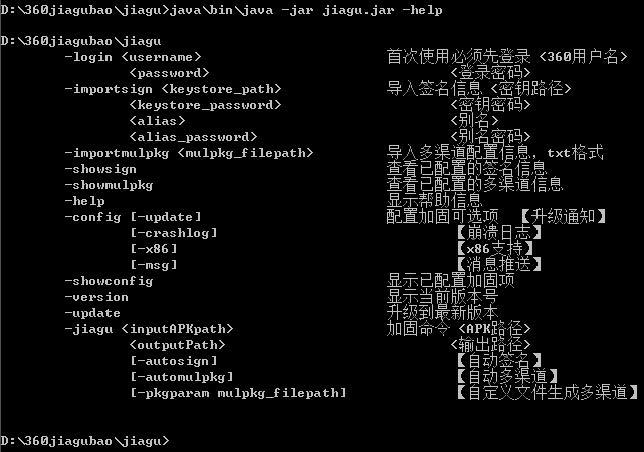
特别提醒,此处360配置可选项的增强服务有bug,已经跟官方沟通,他们需要在下个版本修复,当前存在bug的版本3.2.2.3(2020-03-16),命令行目前无法只选择盗版监测 复制代码
/**
* 对于release apk 进行360加固
*/
def packers360(File releaseApk) {
println 'packers===beginning 360 jiagu'
def packersFile = file(app["packersPath"])
if (!packersFile.exists()) {
packersFile.mkdir()
}
exec {
// 登录360加固保
executable = 'java'
args = ['-jar', packers["jarPath"], '-login', packers["account"], packers["password"]]
println 'packers===import 360 login'
}
exec {
// 导入签名信息
executable = 'java'
args = ['-jar', packers["jarPath"], '-importsign', signing["storeFile"],
signing["storePassword"], signing["keyAlias"], signing["keyPassword"]]
println 'packers===import 360 sign'
}
exec {
// 查看360加固签名信息
executable = 'java'
args = ['-jar', packers["jarPath"], '-showsign']
println 'packers===show 360 sign'
}
exec {
// 初始化加固服务配置,后面可不带参数
executable = 'java'
args = ['-jar', packers["jarPath"], '-config']
println 'packers===init 360 services'
}
exec {
// 执行加固,然后自动签名,若不采取自动签名,需要自己通过build-tools命令自己签名
executable = 'java'
args = ['-jar', packers["jarPath"], '-jiagu', releaseApk.absolutePath, app["packersPath"], '-autosign']
println 'packers===excute 360 jiagu'
}
println 'packers===360 jiagu finished'
println "packers===360 jiagu path ${app["packersPath"]}"
}
复制代码
自动签名
关于自动签名,其实360在加固的时候提供了自动签名的配置选项,如果你不想将签名文件上传给360,在加固后可以自己选择手动签名,因为这涉及到安全性的问题,此版本我采取的是360自动签名,如果大家想自己手动签名,下面我给出一套方案,主要是利用 zipalign 和 apksigner 命令 他们都是位于SDK文件中的build-tools目录中,我们执行自动化签名需要gradle配置好路径。
- 对齐未签名的apk
zipalign -v -p 4 my-app-unsigned.apk my-app-unsigned-aligned.apk 复制代码
- 使用你的私钥为apk签名
apksigner sign --ks my-release-key.jks --out my-app-release.apk my-app-unsigned-aligned.apk 复制代码
- 验证apk是否已经被签名
apksigner verify my-app-release.apk 复制代码
基于加固Apk自动实现多渠道
关于多渠道打包,我们之前项目一直使用的是腾讯的VasDolly,故我们此次是采取VasDolly命令,但是需要先下载 VasDolly.jar ,至于放在什么位置没有要求,只需要gradle配置好路径即可,我直接是放在项目根目录。
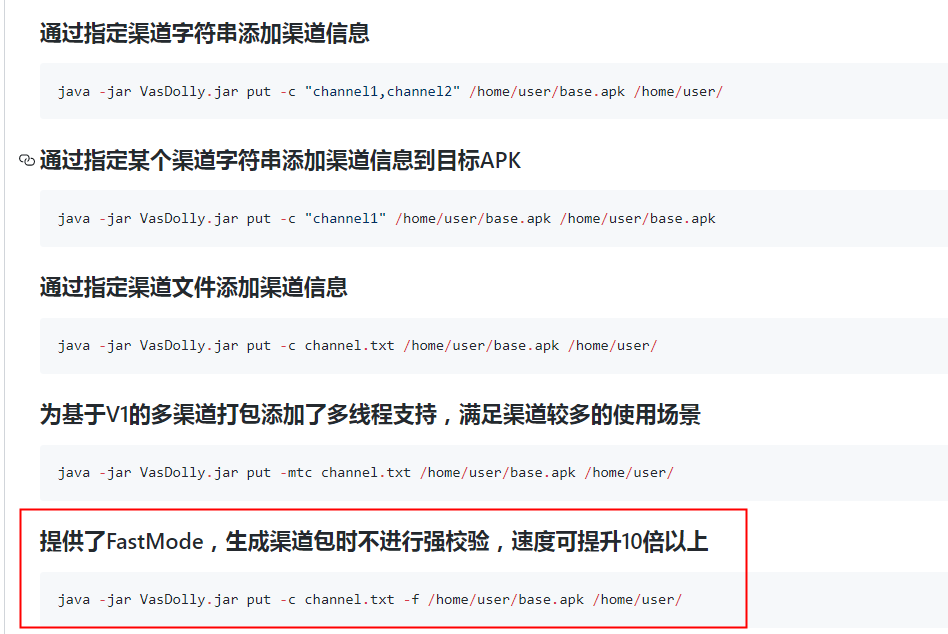
/**
* 腾讯channel重新构建渠道包
*/
def reBuildChannel() {
File channelFile = file("${app["channelPath"]}/new")
if (!channelFile.exists()) {
channelFile.mkdirs()
}
def cmd = "java -jar ${app["vasDollyPath"]} put -c ${"../channel.txt"} ${outputpackersApk()} ${channelFile.absolutePath}"
println cmd
cmd.execute().waitForProcessOutput(System.out, System.err)
println 'packers===excute VasDolly reBuildChannel'
}
复制代码
敏感信息存取
我们都知道,签名需要签名文件,密码、别名等等文件,360加固需要配置账号与密码,这些都属于敏感信息,google官方不建议直接放在gradle中,它是以纯文本记录在gradle中的,建议存储在properties文件中。
// 把敏感信息存放到自定义的properties文件中
def propertiesFile = rootProject.file("release.properties")
def properties = new Properties()
properties.load(new FileInputStream(propertiesFile))
ext {
// 签名配置
signing = [keyAlias : properties['RELEASE_KEY_ALIAS'],
keyPassword : properties['RELEASE_KEY_PASSWORD'],
storeFile : properties['RELEASE_KEYSTORE_PATH'],
storePassword: properties['RELEASE_STORE_PASSWORD']
]
// app相关的配置
app = [
//默认release apk的文件路径,因为加固是基于release包的
releasePath : "${project.buildDir}/outputs/apk/release",
//对release apk 加固后产生的加固apk地址
packersPath : "${project.buildDir}/outputs/packers",
//加固后进行腾讯多渠道打包的地址
channelPath : "${project.buildDir}/outputs/channels",
//腾讯VasDolly多渠道打包jar包地址
vasDollyPath: "../VasDolly.jar"
]
// 360加固配置
packers = [account : properties['ACCOUNT360'], //账号
password : properties['PASSWORD360'], //密码
zipPath : "${project.rootDir}/jiagu/360jiagu.zip", //加固压缩包路径
unzipPath : "${project.rootDir}/jiagu/360jiagubao/", //加固解压路径
jarPath : "${project.rootDir}/jiagu/360jiagubao/jiagu/jiagu.jar", //执行命令的jar包路径
channelConfigPath: "${project.rootDir}/jiagu/Channel.txt", //加固多渠道
jiagubao_mac : "https://down.360safe.com/360Jiagu/360jiagubao_mac.zip", //加固mac下载地址
jiagubao_windows : "https://down.360safe.com/360Jiagu/360jiagubao_windows_64.zip" //加固widnows下载地址
]
复制代码
gradle相关基础
- gradle脚本插件的引用
apply from: "${project.rootDir}/packers.gradle"
复制代码
- 局部变量
def dest = "A" 复制代码
- 扩展属性
使用ext扩展块,一次扩展多个属性
ext {
account = "XXXX"
password = "XXXXX"
}
复制代码
- 字符串相关
单引号不支持插值
def name = '张三'
双引号支持插值
def name = "我是${'张三'}"
三个单引号支持换行
def name = """
张三
李四
"""
复制代码
- 可有可无的圆括号
// 这两种写法等价
println('A')
println 'A'
复制代码
- 闭包作为方法的最后一个参数
repositories {
println "A"
}
repositories() { println "A" }
repositories({println "A" })
复制代码
- task依赖
task B {
// TaskB依赖TaskA,故会先执行TaskA
dependsOn A
//其次执行packersRelease
doLast {
println "B"
}
}
复制代码
- task排序
//taskB必须总是在 taskA 之后运行, 无论 taskA 和 taskB 是否将要运行 taskB.mustRunAfter(taskA) //没有msut那么严格 taskB.shouldRunAfter (taskA) 复制代码
- 文件定位
// 使用一个相对路径
File configFile = file('src/config.xml')
// 使用一个绝对路径
configFile = file(configFile.absolutePath)
// 使用一个项目路径的文件对象
configFile = file(new File('src/config.xml'))`
复制代码
- 文件遍历
// 对文件集合进行迭代
collection.each {File file ->
println file.name
}
复制代码
- 文件复制重命名
copy {
from 源文件地址
into 目标目录地址
rename(“原文件名”, "新文件名字")
}
复制代码
自动上传到服务器
这个功能准备在下篇文章更新,我们可以通过curl命令上传到自己的服务器,如果你在测试阶段可以上传到蒲公英或者fir.im托管平台,目前他们都提供了相关的操作方式,这样基本上整个自动化的目的就完成了,当然你也可以选择Jenknis自动化构建、打包及上传。
- 发布应用到fir.im托管平台 入口
方式一:fir-CLI 命令行工具上传
$ fir p path/to/application -T YOUR_FIR_TOKEN
方式二:API 上传
通过curl命令调用相关的api
1.获取凭证
curl -X "POST" "http://api.bq04.com/apps" /
-H "Content-Type: application/json" /
-d "{/"type/":/"android/", /"bundle_id/":/"xx.x/", /"api_token/":/"aa/"}"
2.上传apk
curl -F "key=xxxxxx" /
-F "token=xxxxx" /
-F "file=@aa.apk" /
-F "x:name=aaaa" /
-F "x:version=a.b.c" /
-F "x:build=1" /
-F "x:release_type=Adhoc" / #type=ios 使用
-F "x:changelog=first" /
https://up.qbox.me
复制代码
- 发布应用到蒲公英 入口
curl -F "file=@/tmp/example.ipa" -F "uKey=" -F "_api_key=" https://upload.pgyer.com/apiv1/app/upload 复制代码
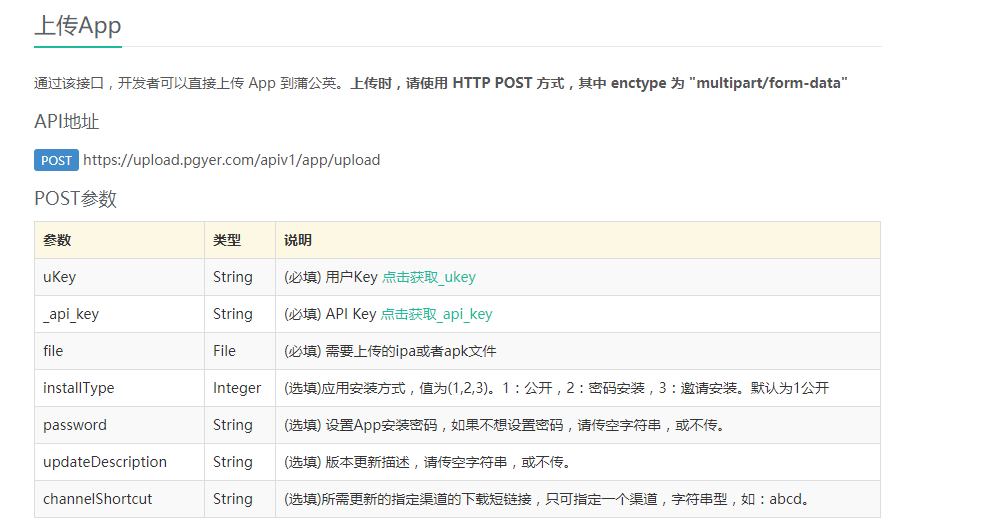
整体效果
我们的需求是需要打两批包,用于老后台与新后台,老后台的包必须加上app-前缀,所以有三个任务 packersNewRelease 执行正常的加固打包用于新后台, packersOldRelease 用于打包加前缀app-名称用于老后台, packersRelease 这个任务用于一键同时打包成老后台与新后台。
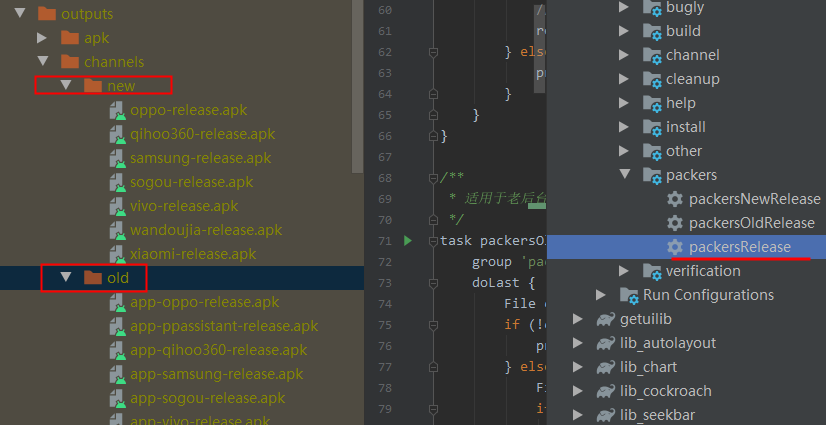
同时可以在gradle控制台查看打包任务的输出日志,如下:
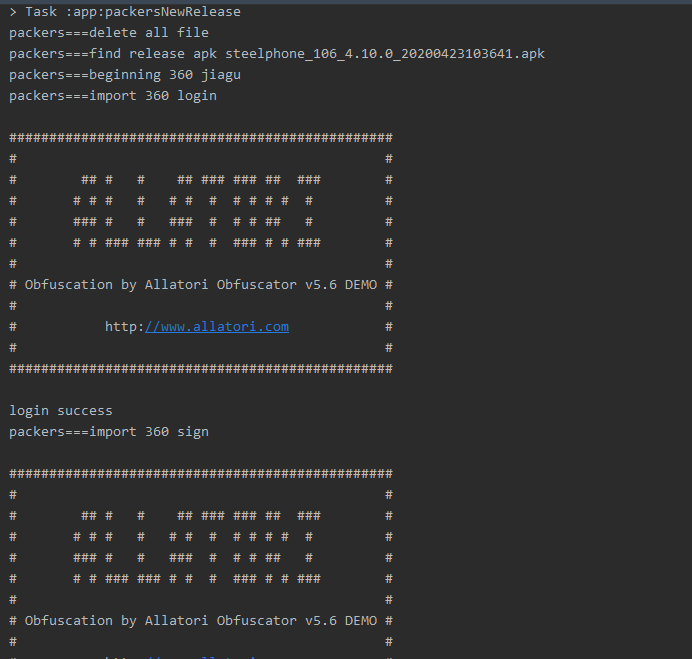
gradle自动化源码
为了能够让大家尝试自动化gradle脚本带来的便利之处,下面我贡献上自己的整个gradle源码,需要的可以拿走去研究,如存在问题也希望多多交流。
/**
* @author hule
* @date 2020/04/15 13:42
* description:360自动加固+Vaslloy多渠道打包
*/
// 把敏感信息存放到自定义的properties文件中
def propertiesFile = rootProject.file("release.properties")
def properties = new Properties()
properties.load(new FileInputStream(propertiesFile))
ext {
// 签名配置
signing = [keyAlias : properties['RELEASE_KEY_ALIAS'],
keyPassword : properties['RELEASE_KEY_PASSWORD'],
storeFile : properties['RELEASE_KEYSTORE_PATH'],
storePassword: properties['RELEASE_STORE_PASSWORD']
]
// app相关的配置
app = [
//默认release apk的文件路径,因为加固是基于release包的
releasePath : "${project.buildDir}/outputs/apk/release",
//对release apk 加固后产生的加固apk地址
packersPath : "${project.buildDir}/outputs/packers",
//加固后进行腾讯多渠道打包的地址
channelPath : "${project.buildDir}/outputs/channels",
//腾讯VasDolly多渠道打包jar包地址
vasDollyPath: "../VasDolly.jar"
]
// 360加固配置
packers = [account : properties['ACCOUNT360'], //账号
password : properties['PASSWORD360'], //密码
zipPath : "${project.rootDir}/jiagu/360jiagu.zip", //加固压缩包路径
unzipPath : "${project.rootDir}/jiagu/360jiagubao/", //加固解压路径
jarPath : "${project.rootDir}/jiagu/360jiagubao/jiagu/jiagu.jar", //执行命令的jar包路径
channelConfigPath: "${project.rootDir}/jiagu/Channel.txt", //加固多渠道
jiagubao_mac : "https://down.360safe.com/360Jiagu/360jiagubao_mac.zip", //加固mac下载地址
jiagubao_windows : "https://down.360safe.com/360Jiagu/360jiagubao_windows_64.zip" //加固widnows下载地址
]
}
/**
* 360加固,适用于新后台打包
*/
task packersNewRelease {
group 'packers'
dependsOn 'assembleRelease'
doLast {
//删除加固后的渠道包
deleteFile()
// 下载360加固文件
download360jiagu()
// 寻找打包文件release apk
def releaseFile = findReleaseApk()
if (releaseFile != null) {
//执行加固签名
packers360(releaseFile)
//对加固后的apk重新用腾讯channel构建渠道包
reBuildChannel()
} else {
println 'packers===can/'t find release apk and can/'t excute 360 jiagu'
}
}
}
/**
* 适用于老后台,老后台需要在渠道apk的名称增加前缀 app-
*/
task packersOldRelease {
group 'packers'
doLast {
File channelFile = file("${app["channelPath"]}/new")
if (!channelFile.exists() || !channelFile.listFiles()) {
println 'packers==== please excute pakcersNewRelease first!'
} else {
File oldChannelFile = file("${app["channelPath"]}/old")
if (!oldChannelFile.exists()) {
oldChannelFile.mkdirs()
}
// 对文件集合进行迭代
channelFile.listFiles().each { File file ->
copy {
from file.absolutePath
into oldChannelFile.absolutePath
rename(file.name, "app-${file.name}")
}
}
println 'packers===packersOldRelease sucess'
}
}
}
/**
* 加固后,打新版本的渠道包时,同时生成老版本的渠道包
*/
task packersRelease {
group 'packers'
dependsOn packersNewRelease
dependsOn packersOldRelease
packersOldRelease.mustRunAfter(packersNewRelease)
doLast {
println "packers===packersRelease finished"
}
}
/**
* 对于release apk 进行360加固
*/
def packers360(File releaseApk) {
println 'packers===beginning 360 jiagu'
def packersFile = file(app["packersPath"])
if (!packersFile.exists()) {
packersFile.mkdir()
}
exec {
// 登录360加固保
executable = 'java'
args = ['-jar', packers["jarPath"], '-login', packers["account"], packers["password"]]
println 'packers===import 360 login'
}
exec {
// 导入签名信息
executable = 'java'
args = ['-jar', packers["jarPath"], '-importsign', signing["storeFile"],
signing["storePassword"], signing["keyAlias"], signing["keyPassword"]]
println 'packers===import 360 sign'
}
exec {
// 查看360加固签名信息
executable = 'java'
args = ['-jar', packers["jarPath"], '-showsign']
println 'packers===show 360 sign'
}
exec {
// 初始化加固服务配置,后面可不带参数
executable = 'java'
args = ['-jar', packers["jarPath"], '-config']
println 'packers===init 360 services'
}
exec {
// 执行加固
executable = 'java'
args = ['-jar', packers["jarPath"], '-jiagu', releaseApk.absolutePath, app["packersPath"], '-autosign']
println 'packers===excute 360 jiagu'
}
println 'packers===360 jiagu finished'
println "packers===360 jiagu path ${app["packersPath"]}"
}
/**
* 自动下载360加固保,也可以自己下载然后放到根目录
*/
def download360jiagu() {
// 下载360压缩包
File zipFile = file(packers["zipPath"])
if (!zipFile.exists()) {
if (!zipFile.parentFile.exists()) {
zipFile.parentFile.mkdirs()
println("packers===create parentFile jiagu ${zipFile.parentFile.absolutePath}")
}
// 加固保的下载地址
def downloadUrl = isWindows() ? packers["jiagubao_windows"] : packers["jiagubao_mac"]
// mac自带curl命令 windows需要下载curl安装
def cmd = "curl -o ${packers["zipPath"]} ${downloadUrl}"
println cmd
cmd.execute().waitForProcessOutput(System.out, System.err)
}
File unzipFile = file(packers["unzipPath"])
if (!unzipFile.exists()) {
//解压 Zip 文件
ant.unzip(src: packers["zipPath"], dest: packers["unzipPath"], encoding: "GBK")
println 'packers===unzip 360jiagu'
//将解压后的文件开启读写权限,防止执行 Jar 文件没有权限执行,windows需要自己手动改
if (!isWindows()) {
def cmd = "chmod -R 777 ${packers["unzipPath"]}"
println cmd
cmd.execute().waitForProcessOutput(System.out, System.err)
}
}
}
/**
* 腾讯channel重新构建渠道包
*/
def reBuildChannel() {
File channelFile = file("${app["channelPath"]}/new")
if (!channelFile.exists()) {
channelFile.mkdirs()
}
def cmd = "java -jar ${app["vasDollyPath"]} put -c ${"../channel.txt"} ${outputpackersApk()} ${channelFile.absolutePath}"
println cmd
cmd.execute().waitForProcessOutput(System.out, System.err)
println 'packers===excute VasDolly reBuildChannel'
}
/**
* 是否是windows系统
* @return
*/
static Boolean isWindows() {
return System.properties['os.name'].contains('Windows')
}
/**
* 寻找本地的release apk
* @return true
*/
def deleteFile() {
delete app["channelPath"]
delete app["packersPath"]
println 'packers===delete all file'
}
/**
* 首先打一个release包,然后找到当前的文件进行加固
* @return releaseApk
*/
def findReleaseApk() {
def apkDir = file(app["releasePath"])
File releaseApk = apkDir.listFiles().find { it.isFile() && it.name.endsWith(".apk") }
println "packers===find release apk ${releaseApk.name}"
return releaseApk
}
/**
* 加固输出并且重新命名
* @return packersApk
*/
def outputpackersApk() {
File oldApkDir = file(app["packersPath"])
File oldApk = oldApkDir.listFiles().find { it.isFile() && it.name.contains("jiagu") }
println "packers===output pacckers sourceApk ${oldApk.name}"
copy {
from app["packersPath"] + File.separator + oldApk.name
into app["packersPath"]
rename(oldApk.name, "release.apk")
println 'packers===output pacckers renameApk release.apk'
}
File newApk = oldApkDir.listFiles().find { it.isFile() && it.name.equals("release.apk") }
println "packers===output packers renameApk${newApk.absolutePath}"
return newApk.absolutePath
}
复制代码
结语
本篇文章分享是基于360加固与腾讯VasDolly多渠道打包的自动化实践,提供的只是一种方式,不限于这两个平台,其他平台无非也就是更换一下加固与多渠道打包的命令,喜欢这篇gradle自动化加固与多渠道打包就随手点个赞吧,你的点赞是我写作的动力!
- 本文标签: find IOS Google equals key 服务器 http jenkins 安装 Collection App linux 参数 源码 下载 API token XML root ask 自动化 安全 IO 时间 插件 测试 js 文章 调试 bug json zip src windows cat Service 需求 加密 文件上传 编译 https Word UI id 遍历 java build cmd description 特别提醒 代码 stream list ldap 删除 ip 配置 希望 Android 目录 example tab
- 版权声明: 本文为互联网转载文章,出处已在文章中说明(部分除外)。如果侵权,请联系本站长删除,谢谢。
- 本文海报: 生成海报一 生成海报二











![[HBLOG]公众号](https://www.liuhaihua.cn/img/qrcode_gzh.jpg)

